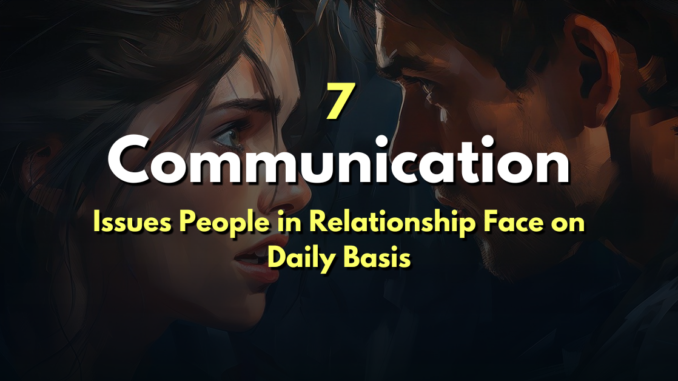
Communication issues between couples are like tangled knots that can be resolved with patience and understanding. Sometimes, it’s as simple as lacking basic communication skills which means clearly expressing thoughts and listening with empathy. Unresolved conflicts linger like unwelcome guests, waiting to resurface time and time again.
Different communication styles can lead to misunderstandings, very much like speaking different languages. Past experiences and traumas may cast shadows on present interactions, making it hard to connect with each other fully. Without emotional intimacy, trust and vulnerability, couples may leave their partners feeling distant. External stressors add more pressure, making it harder to communicate effectively. And assumptions or misinterpretations can muddy the waters even further. But with openness, empathy, and a willingness to talk things out, couples can untangle these knots and strengthen their connection.
Here are 7 communication issues people in relationship suffer almost everyday:
Poor Communication Skills:
Effective communication involves not just speaking, but also active listening and understanding. Many people haven’t been taught these skills when they were growing up, and as a result, they may struggle to express themselves clearly or to truly listen to their partner’s perspective. Without these foundational skills, misunderstandings can easily occur which leads to frustration and resentment.
Unresolved Conflict:
Conflict is a natural part of any relationship, but how couples navigate and resolve these conflicts is a crucial aspect. When conflicts are left unresolved, they can linger and create a rift between partners. This often happens when one or both partners avoid difficult conversations or sweep issues under the rug in an attempt to maintain harmony. This happens with people who are non confrontational in the first place. However, unresolved conflicts tend to resurface later, often with even greater intensity.
Follow Dnyan Power WhatsApp Channel to get regular updates
Different Communication Styles:
Each person brings their own unique communication style to their relationship, shaped by factors such as upbringing, culture, and personality. These differences can complement each other, but they can also lead to misunderstandings if not acknowledged and respected.
For example, one partner may be more direct and assertive in communication, while the other may be more indirect or reserved. These differences can lead to clashes if not navigated with sensitivity and understanding.
Emotional Baggage:
Past experiences and traumas can significantly impact how individuals communicate in their current relationships. For example, someone who has been hurt in the past may have difficulty trusting their partner or expressing vulnerability.
Similarly, unresolved issues from childhood, such as attachment issues, abandonment issues or family dynamics, can influence how people relate to their partners as adults. Without addressing these underlying issues, individuals may inadvertently bring past hurts into their current relationship, leading to communication barriers.
Lack of Emotional Intimacy:
Emotional intimacy is the foundation of a healthy relationship, but it requires vulnerability and openness from both partners. Some people may struggle to express their emotions due to fear of rejection or judgment. Others may have difficulty empathizing with their partner’s emotions or understanding their own feelings. When emotional intimacy is lacking, couples may feel disconnected and struggle to communicate effectively about their needs and desires.
External Stressors:
Outside pressures, such as work stress, financial worries, or family responsibilities, can take a toll on communication within a relationship. When individuals are preoccupied with these stressors, they may have less energy and patience for meaningful communication with their partner. This can lead to misunderstandings, arguments, and feelings of neglect if not addressed proactively.
Assumptions and Misinterpretations:
Communication is not just about what is said but also how it is interpreted. Assumptions and misinterpretations can easily occur, especially in the absence of clear and open communication. For example, one partner may assume they know what the other is thinking or feeling without actually asking. This may lead to misunderstandings and hurt feelings if those assumptions turn out to be incorrect. Similarly, nonverbal cues such as body language and tone of voice can be misinterpreted, leading to further communication breakdowns.
Addressing communication issues in a relationship requires both partners to be willing to engage in open and honest dialogue, actively listen to each other’s perspectives, and work together to find common ground. This involves practicing empathy, setting aside defensiveness, and being willing to compromise. Couples therapy or relationship counseling can be valuable tools for improving communication skills and resolving underlying issues within the relationship. By prioritizing effective communication, couples can strengthen their connection and build a healthier, more fulfilling partnership.
Content on this blog, including text, some images, and other creative works, is the intellectual property of Dnyan Power and is protected by copyright law. Unauthorized use or reproduction of any content without prior written permission is strictly prohibited. For inquiries or permissions, please Contact Us or email us at quantumhypnosisplr@gmail.com

About Author
Shivangi Javkar
Mental Health Counselor, Digital Creator & Social Media Marketer at Quantum Holistic Health
+91 7400473893


Leave a Reply